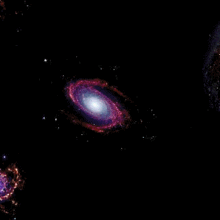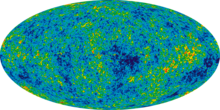
| Part of a series on |
| Physical cosmology |
|---|
 |
The Big Crunch is a hypothetical scenario for the ultimate fate of the universe, in which the expansion of the universe eventually reverses and the universe recollapses, ultimately causing the cosmic scale factor to reach zero, an event potentially followed by a reformation of the universe starting with another Big Bang. The vast majority of evidence indicates that this hypothesis is not correct. Instead, astronomical observations show that the expansion of the universe is accelerating rather than being slowed by gravity, suggesting that a Big Freeze is more likely.[1][2][3] Nonetheless, some physicists have proposed that a "Big Crunch-style" event could result from a dark energy fluctuation.[4]
The hypothesis dates back to 1922, with Russian physicist Alexander Friedmann creating a set of equations showing that the end of the universe depends on its density. It could either expand or contract rather than stay stable. With enough matter, gravity could stop the universe's expansion and eventually reverse it. This reversal would result in the universe collapsing on itself, not too dissimilar to a black hole.[5]
The ending of the Big Crunch would get filled with radiation from stars and high-energy particles; when this is condensed and blueshifted to higher energy, it would be intense enough to ignite the surface of stars before they collide.[6] In the final moments, the universe would be one large fireball with a temperature of infinity, and at the absolute end, neither time, nor space would remain.[7]
- ^ "The Nobel Prize in Physics 2011". NobelPrize.org. Retrieved 2020-09-27.
- ^ Falk, Dan (22 June 2020). "This Cosmologist Knows How It's All Going to End". Quanta Magazine. Retrieved 2020-09-27.
- ^ Perlmutter, Saul (April 2003). "Supernovas, Dark Energy, and the Accelerating Universe". Physics Today. 56 (4): 53–60. Bibcode:2003PhT....56d..53P. doi:10.1063/1.1580050. ISSN 0031-9228.
- ^ Sutter, Paul (March 2023). "Dark energy could lead to a second (and third, and fourth) Big Bang, new research suggests". Space.com.
- ^ "Friedmann universe | cosmology | Britannica". www.britannica.com. Retrieved 2022-12-15.
- ^ Mack, Katie (2020). The end of everything (astrophysically speaking). New York. p. 65. ISBN 978-1-9821-0354-5. OCLC 1148167457.
{{cite book}}: CS1 maint: location missing publisher (link) - ^ Rosenthal, Vlad (2011). From the Big Bang to the Big Crunch and Everything in Between A Simplified Look at a Not-So-Simple Universe. iUniverse. p. 194. ISBN 9781462016990.